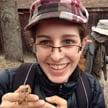-
Asked by 425hyda23 to Avani, Jeff, Kenzi, Lindsay, Zoe on 15 May 2015.0
Question: WHAT IS LOVE?
- Keywords:
-
Zoe GetmanPickering answered on 15 May 2015:
All you need is love!
That’s a tricky question, and one that scientists are still trying to answer. Scientifically, love is hormones (dopamine, norepinephrine, serotonin, oxytocin and vasopressin) in your brain that make you happy and make you feel attached to someone else, be it a family member or lover.
Why do we fall in love with someone? Who know. -
Kenzi Clark answered on 16 May 2015:
Baby, don’t hurt me, don’t hurt me, no more. Whoa whoa whoa whoooooaaaaa whooooooaaaaaa whoooa. 🙂
Hahahaha….that’s me singing this song 🙂
-
K. Lindsay Hunter answered on 16 May 2015:
Like Zoe has said, a lot of love has to do with chemistry, especially when it works on the rewards center of our brain. These hormones and neurochemicals work to reinforce positive interactions between individuals of a species (and even across species) and don’t just cause us to fall in love, but they also help us to form alliances. These chemicals are very important for socially gregarious animals (like humans!) in determining who you’ll work with.
In a crude sense, though, love came out of sex, in which reproduction is the name of the game for species as a whole. In natural selection, each individual tries to get as many of their genes into the next generation as possible and there’s too basic ways to do that. We call these two life history strategies r and K. In r-selected animals, they opt to have as many offspring as possible and then not put a lot of parental investment into making sure that they live, relying on statistics to push a decent number through to reproduce themselves (think salmon or frogs with tons of eggs they don’t sit on). K-selected animals do the opposite; they have fewer offspring, but they put a lot of effort into taking care of them, and some even raise their young up in order to give them the best chance to reproduce themselves (sound like us?).
As an order, Primates as a whole are pretty K-selected; that is, monkeys and even lemurs don’t generally have litters of babies like cats or dogs (which are also relatively K-selected), they have one or two. A lot of this strategy then also relates to the fact that primates have bigger brains than other animals relative to their body size (we’re at the high end of this trend), and that brain and its protective skull aren’t full grown when we’re born or our mothers would all die in childbirth (and in natural selection, that’s a pretty definite end to your passing on your genes). So, as a compromise, our brains do a lot of their development AFTER we’re born, which means an extended childhood (humans are an extreme example of this), and that means we rely on our parents (and other members of our groups) to take care of us and not chuck us into the river when we cry. Attachment hormones are a big help to keeping our parents and sometimes even other adults from killing us when we’re young and vulnerable, and form a strong bond between members of a family unit. Also, as humans have evolved, we’ve mostly turned to a fairly pair-bonded way of parenting, so the hormones that reinforce romantic love, work hard to keep a male with his family and taking care of them rather than roaming about and spreading his genes all over the place, and keep the female with her young. These are the evolutionary roots of what we experience as love.






Comments
Kenzi commented on :
OH MY GOSH @Jeff @Zoe. Hahahaha! I didn’t scroll down to see you two had already answered in lyrics! Great minds think alike 🙂
Zoe commented on :
You and Jeff picked the best song, but there are one hundred and one great songs that would fit. and they are all stuck in my head now.